

The dignity of Greece. Crowds celebrate the “no” vote in Athens’ Syntagma Square, July 5, 2015.

Photo from @socialistworker It’s important to remember that a lot of people will suffer because of the vote last night. They would have suffered if the vote had gone “yes,” and they will suffer now because the vote went “no.” To imagine otherwise, to think that from here on it gets easy, is to slight the rooted courage of their rejection.
Greeks were ready for defiance because they had already suffered for seven years, in the kind of agony rarely inflicted on a developed economy outside a science-fiction movie; but they know that things can get worse, and in the short run, they will. Ἀλλὰ φίλος θάνε καὶ σύ: τί ἦ ὀλοφύρεαι οὕτως; κάτθανε καὶ Πάτροκλος, ὅ περ σέο πολλὸν ἀμείνων.Come, friend, you too must die. Brave and unflinching, Greeks have earned the right to celebrate for a while in Syntagma Square. The left prides itself on empathy, on getting in the skins of others. We’re not all Greeks. Nothing but a dream. Last June, the American theoretical physicist Lawrence Krauss appeared on the ABC’s Q&A.

During a brief discussion about public broadcasting – which, despite such programs as Sesame Street, Frontline and This American Life, is deeply impoverished in the US in comparison with its counterparts in the UK and Australia – Krauss expressed concern about the direction of the Abbott government’s policies. “What worries me about this particular government is they’re trying to make Australia more like the US, and it’s an awful thing.” Later in the same program, fellow panellist, adman-turned-commentator Rowan Dean explained why he supported the government’s policy of university deregulation. “We want to be like America,” Dean told Krauss. “We do. It was the kind of mocking praise that’s designed to knock the wind out of a debating opponent’s sails.
That’s mostly myth. But it’s a myth that holds sway with the Australian right. Sasha is one of America’s “winners”. Many are not as lucky as Sasha. Why racism is not backed by science. Barely a week goes by without some dispiriting tale of racism seeping into the public consciousness: the endless stream of Ukip supporters expressing some ill-conceived and unimaginative hate; football hooligans pushing a black man from a train.

I am partly of Indian descent, a bit swarthy, and my first experience of racism was more baffling than upsetting. In 1982, my dad, sister and I were at the Co-op in a small village in Suffolk where we lived, when some boys shouted “Coco and Leroy” at us. Fame was the big hit on telly at the time, and they were the lead characters. My sister and I thought this was excellent: both amazing dancers and supremely attractive: we did bad splits all the way home. Darwin was not a racist. Obviously, these views are as absurd as they are unacceptable today, as bewildering as calling two half-Indian kids the stage names of two African-American actors. Genetics has a blighted past with regards to race. We harvest thousands of human genomes every week. What ISIS Really Wants. What is the Islamic State?

Where did it come from, and what are its intentions? The simplicity of these questions can be deceiving, and few Western leaders seem to know the answers. In December, The New York Times published confidential comments by Major General Michael K. “Queue jumping”: the view from afar. I am sitting on a mattress on the floor of a demountable building in the Al Zaatari refugee camp in Jordan.

After meeting me at a neighbour’s, Fatema brought me here to drink tea, meet some of her family, and tell me about her circumstances. She and her family have been living here since they fled the fighting in Syria. Fatema is the lively matriarch of a family of twenty. Quick to laugh and brimming with stories from five decades of life in Syria, she explains how she ended up in the camp. “I saw myself dying,” she tells me. Not a Very P.C. Thing to Say. How the language police are perverting liberalism.

Photographs by Bobby Doherty Around 2 a.m. on December 12, four students approached the apartment of Omar Mahmood, a Muslim student at the University of Michigan, who had recently published a column in a school newspaper about his perspective as a minority on campus. The students, who were recorded on a building surveillance camera wearing baggy hooded sweatshirts to hide their identity, littered Mahmood’s doorway with copies of his column, scrawled with messages like “You scum embarrass us,” “Shut the fuck up,” and “DO YOU EVEN GO HERE?!
LEAVE!!” They posted a picture of a demon and splattered eggs. This might appear to be the sort of episode that would stoke the moral conscience of students on a progressive campus like Ann Arbor, and it was quickly agreed that an act of biased intimidation had taken place.